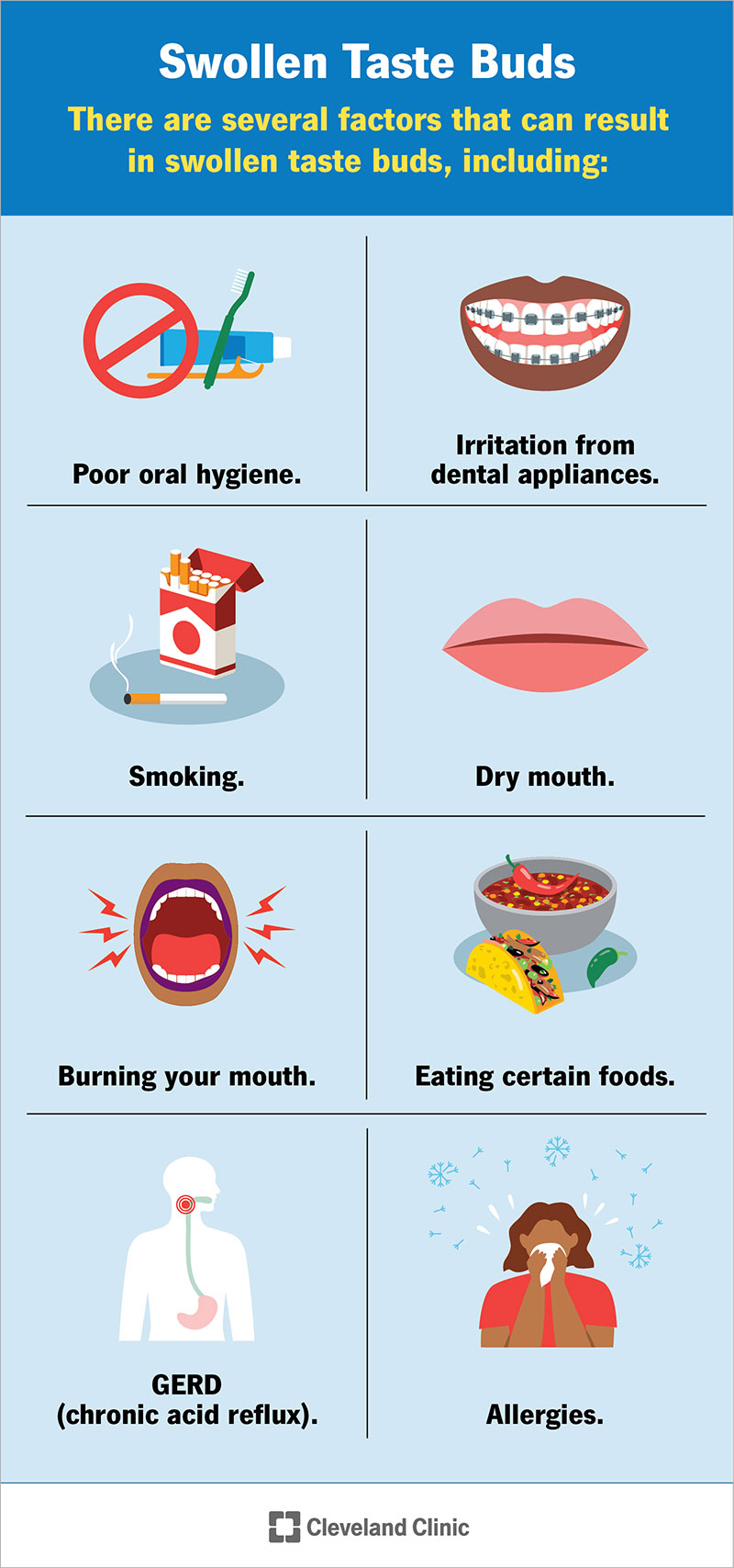A swollen taste bud can result from burning your tongue, eating spicy foods or having conditions like allergies or dry mouth. Even stress can cause it. Swollen taste buds aren’t serious and usually heal on their own in just a few days. Saltwater rinses and antiseptic mouthwashes can help ease your symptoms.
Advertisement
Cleveland Clinic is a non-profit academic medical center. Advertising on our site helps support our mission. We do not endorse non-Cleveland Clinic products or services. Policy

Image content: This image is available to view online.
View image online (https://my.clevelandclinic.org/-/scassets/Images/org/health/articles/24544-swollen-taste-buds)
A swollen taste bud is a taste bud that’s inflamed or irritated for some reason. Thousands of taste buds cover your tongue. These tiny sensory organs help you tell the difference between sweet, salty, sour and bitter flavors. But like other places on your body, your taste buds can become inflamed. Swollen taste buds can result in pain and sensitivity, particularly when eating or drinking.
Advertisement
Cleveland Clinic is a non-profit academic medical center. Advertising on our site helps support our mission. We do not endorse non-Cleveland Clinic products or services. Policy
People may have several swollen taste buds or just one. They’re generally harmless and tend to go away on their own in just a few days. Less commonly, swollen taste buds may indicate another underlying condition, such as acid reflux, dry mouth or allergies.
How common are swollen taste buds?
Swollen taste buds are common. Experts estimate that over 50% of people in the U.S. develop them at one time or another.
Swollen taste bud symptoms may include spots on your tongue that are:
There are several factors that can result in swollen taste buds, including:
Advertisement
A healthcare provider can diagnose swollen taste buds with a visual oral examination. But you probably don’t need to see your provider unless the spots on your tongue last longer than two weeks or you have pain that interferes with your quality of life.
When swollen taste buds aren’t linked to another underlying condition, your symptoms should go away on their own in a few days. But if another health condition causes swollen taste buds, you can get rid of them by treating the underlying issue.
For example, if allergies cause swollen taste buds, avoid the food or medication that triggered your symptoms. If your taste buds tend to swell when you have acid reflux, take antacids, proton-pump inhibitors or H2-receptor blockers to ease discomfort.
If swollen taste buds last longer than two weeks and you’re not sure what caused the inflammation, talk to a healthcare provider. You might need treatment.
While you wait for the inflammation to go down, there are things you can do to soothe your swollen taste buds:
Yes, your swollen taste bud should go away in a few days. Some people may even have inflammation for a week or more. But if you notice lingering symptoms, it could indicate another underlying condition. In these cases, you should see a healthcare provider.
Though you can’t always prevent swollen taste buds, there are things you can do to reduce your risk:
If you still have swollen taste buds after two weeks, schedule an appointment with your healthcare provider. They can help determine whether an underlying condition caused the inflammation.
You should also call your provider if you have pain or discomfort that keeps you from your normal routines.
If you have one or more swollen taste buds, here are some questions you might want to ask your healthcare provider:
It’s common to have a single swollen taste bud. It could be the result of biting your tongue or even just the natural exfoliation of cells on your tongue.
A whitish appearance can indicate a swollen taste bud. Many factors can cause this, including stress, vitamin deficiencies or certain foods.
Swollen taste buds are inconvenient at best. They’re not dangerous, but they can lead to pain and irritation. Home remedies, like sucking on ice or rinsing with warm saltwater, can ease your symptoms most of the time. But if you have swollen taste buds that last for two weeks or more, talk to your healthcare provider.
Advertisement

Sign up for our Health Essentials emails for expert guidance on nutrition, fitness, sleep, skin care and more.
Learn more about the Health Library and our editorial process.
Cleveland Clinic’s health articles are based on evidence-backed information and review by medical professionals to ensure accuracy, reliability and up-to-date clinical standards.
Cleveland Clinic’s health articles are based on evidence-backed information and review by medical professionals to ensure accuracy, reliability and up-to-date clinical standards.
Need care fast? Cleveland Clinic’s Express Care and Urgent Care locations treat everything from sprains to sinus infections — no appointment needed.
